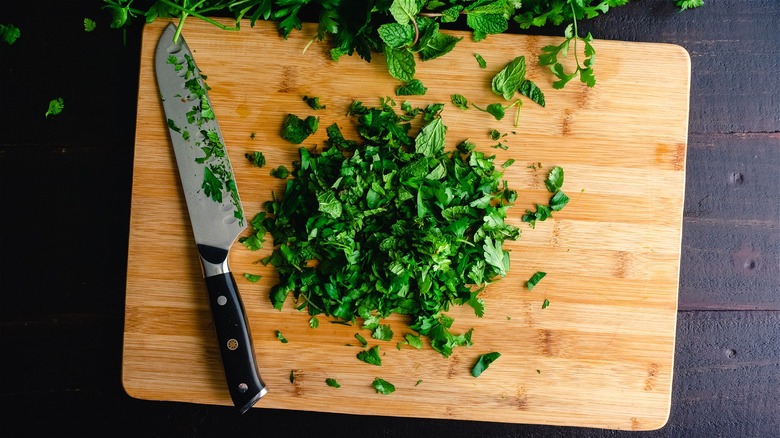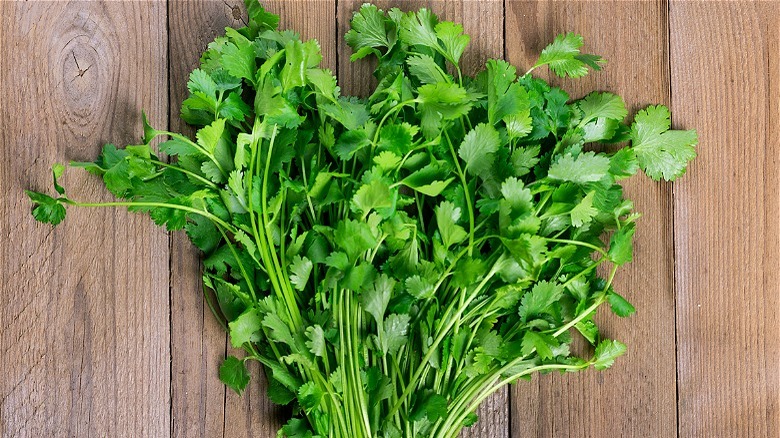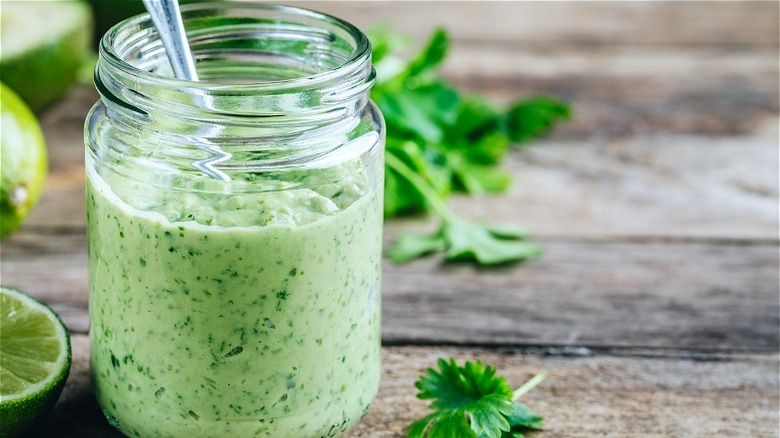Why It's Worth Buying Fresh Parsley And Cilantro Over Dried
Most home cooks can attest to the power of fresh herbs. When added to a steamy bowl of soup, a fresh plate of greens, or reheated leftovers, these aromatic leaves provide a number of tasty dishes with an extra burst of flavor. While dried herbs are great to add to recipes during the cooking process, fresh herbs are added through preparation but also as a garnish to your favorite meals. Some raw herbs even serve as the anchor of an entire recipe, such as basil in traditional pesto.
Besides the unbeatable element of greenness raw herbs can bring to your favorite recipes, fresh-cut herbs also provide your body with a number of healthy nutrients. According to the Better Health Channel, fresh herb consumption has been shown to limit your risk of certain cancers, reduce inflammation, and aid in the maintenance of a healthy heart. Dried herbs may have a longer shelf life and be more economical in the long run, but in the production process, your most coveted spices lose many of their nutritional benefits.
Buying fresh parsley, thyme, basil, mint, and cilantro all in one trip seems a tad outlandish. After all, even when fresh herbs are stored properly, they usually only last up to three weeks in the refrigerator. Out of all the fresh herbs to buy regularly, parsley and cilantro may serve as the most versatile and beneficial.
Why is it better to buy parsley and cilantro fresh?
If you're a regular at-home chef, you've most likely deliberated over when to use fresh herbs or dry herbs a number of times throughout your culinary adventures. Dried herbs are often more concentrated: if a recipe calls for fresh herbs, you probably need less if you decide to use dried alternatives.
Parsley and cilantro are two herbs that are best used fresh because they're more delicate in nature than herbs such as rosemary or tarragon. Spiceography notes that the flavor of dried parsley is actually more muted than its fresh counterpart. While dried parsley can be added to create minor subtleties in your best dishes, fresh parsley imparts a peppery element that can brighten any mundane meal.
On the other hand, cilantro, an herb closely related to parsley, has a more pungent flavor. Even though cilantro can be added to dishes in the cooking process, due to its fragile makeup, the leaves and stems are often used to dress up dishes and serve as a garnish or finishing touch. Cilantro's flavor is somewhat peppery but also has a strong citrus flavor. Due to a genetic factor, some foodies can't tolerate cilantro for it tends to impart a soap-like flavor. All in all, however, fresh parsley and cilantro aren't consigned to only a few dishes. Their versatility makes them both great additions to your favorite meals.
Creative ways to use fresh parsley and cilantro
Sure, you can always add a heaping tablespoon of cilantro to your fresh guacamole recipe and use fresh parsley to make homemade chimichurri sauce. But these two herbs also serve as great additions to the simplest of meals.
Parsley can be added to almost any savory dish for an extra herbaceous element of flavor. Because the leaves impart a mild essence, you can add them to simple roasted potatoes, your favorite tuna salad, and even atop your favorite morning frittata recipe. On the other hand, cilantro is typically used in many types of culturally rich foods with a Mexican or Latin American flair. However, because cilantro is considered to have a subtle flavor, it's also used in everyday recipes, such as green goddess dressing. Regardless of how you use parsley and cilantro to dress up your favorite meals, make sure to store your herbs properly. Parsley and cilantro are stored in the same way. Simply trim the stems, wrap them in wet paper towels, and place them in a plastic storage bag in your refrigerator.
When it comes to buying fresh herbs, you'll get the most bang for your buck when purchasing cilantro and parsley, as they can be used in a variety of ways. Feel free to get creative and see how the delicate flavors of these two green herbs can entice your palate.


